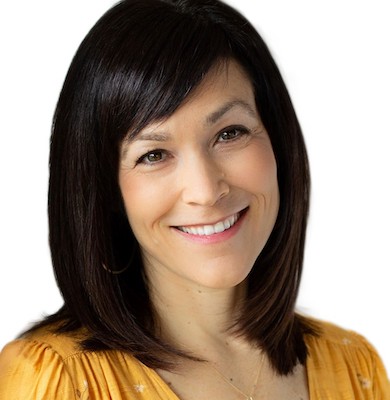
We all experience failure, make bad decisions, and come up short sometimes. Yet, we are constantly surrounded by images (we’re looking at you, social media) of other people thriving, looking like they’ve got it all figured out, just out there living their best lives. So, we find ourselves stuck in an eternal game of comparisons, as we judge our everyday, messy lives against other people’s highlight reels.
It’s completely understandable behavior because we’re biologically wired to compare ourselves to others. It’s how we develop an understanding of who we are and what we’re good at and not so good at. But, when we constantly undermine our abilities by looking at everyone else’s achievements, it can start to take a toll on our mental health.
So how do we drop the comparisons and begin to focus on fully loving ourselves for who we are, not who we think we should be? There’s no miracle mantra that can snap us out of it, but as mental health coaches, we’ve learned tried and true steps that you can take to help you begin to drop the comparisons and develop true self-love.
The difference between self-love and self-compassion
As we start to intentionally appreciate ourselves and step out of the shadows of comparison, it can be helpful to understand the difference between self-love and self-compassion.
Self-love is the type of appreciation for yourself that grows from taking care of your well-being, while not sacrificing for others or settling for less than you deserve. For example, if your friend invites you to a party, but you know that you’re feeling burned out and need some downtime, saying no is an act of self-love. You’re setting a boundary and listening to what you need. This is a healthy and balanced love for yourself and it’s much different than things such as vanity, selfishness, narcissism, etc.
Self-compassion is appreciation and grace turned inward. By demonstrating self-compassion, we give ourselves permission to be human. So, when you accidentally forget your child’s stuffed animal at the park, instead of beating yourself up, you reassure yourself that it’s okay, even though you made a very human mistake.
Kristen Neff PhD., author and researcher of self-compassion, explains it is “the ability to hold one’s feelings of suffering with a sense of warmth, connection and concern. Self-compassion entails being warm and understanding toward ourselves when we suffer, fail, or feel inadequate, rather than ignoring our pain or flagellating ourselves with self-criticism. When this reality is denied or fought against, suffering increases in the form of stress, frustration and self-criticism.”
How to drop the comparisons
It can be tricky to extend the same grace to ourselves that we give to others. But beginning to incorporate self-love practices into our daily lives can help us to see ourselves for all we all — unique, worthy, capable, loveable, resilient, and inherently flawed humans.
“Where often there’s no one we treat as badly as ourselves, what if we stopped judging and evaluating ourselves, put away trying to label ourselves ‘good or bad’ and simply accept ourselves with an open heart?” shares Neff. “To treat ourselves with the same kind of kindness, caring and compassion we would show to a good friend, or even a stranger for that matter.”
The next time you find yourself struggling to extend kindness to yourself, take the practices below into consideration and notice how it feels to do things a little differently.
- Recognize the things you love about yourself. When was the last time you took a moment to notice and celebrate what makes you you? Here’s your chance. Grab a piece of paper and make a list of all of the attributes that you appreciate about yourself. Maybe you’ve recently done something that felt brave, maybe you’ve shown up for a friend recently, or maybe you like the color of your eyes. Nothing is too big or too small for this list, so take a few minutes and heap on the praise. Come back to this list anytime you’re not feeling yourself for an instant boost.
- Create your own affirmations. The way we speak to ourselves holds great power. The next time you find yourself stuck in comparison, try offering words of comfort and encouragement, the way you would talk to a close friend. We may not be in control of what happens throughout the day, but we can begin to reshape how we see and treat ourselves through the ups and downs. Here are some examples of affirmations that have worked for our clients: “I am capable of doing hard things”, “I am worthy of being loved, cherished, and celebrated”, “I am growing and learning every single day”, and “I am doing the best with what I have.”
- Give meditation a try. We often think of meditation as the practice of being seated in a dimly lit and quiet room with soft music playing and the innate ability to keep those intrusive thoughts at bay. In reality, it can look and feel different for every person. Here is a quick guided meditation that will help you quiet the inner critic. Remember, if meditation isn’t your thing, there are other ways to practice mindfulness.
- Incorporate a growth mindset. We can easily get discouraged when trying something new or unfamiliar, leading us to compare ourselves to others who are seemingly doing it better. The power of a growth mindset is building evidence that things are possible for you in the future, as you take on challenges, learn from them, and increase your abilities. It involves reminding yourself, “Sure, I don’t know how to do this… YET” as opposed to, “I’ll never be able to do this.” Want to start your day with this mindset? Before diving into the day’s responsibilities, take a few minutes for yourself with this grounding exercise.
- Focus on your own goals. Let’s go on a fact-finding mission. Notice the areas in which you compare yourself to others and try to understand, with self-compassion, what is going on for you. Do you feel less than because someone is constantly highlighting their fitness routine? How can you use this information to set and reach your own goals? Instead of looking outwards, go within and start to take small steps towards your own well-being. This one is easier said than done, but you can start by setting one tiny goal today — like taking a walk outside, doing a few stretches that feel good, or dancing to one song that you love.
- Take a social media break. You probably knew this one was coming, didn’t you? Social media has a way of curating everyone’s best moments and presenting them to us for consumption when we’re feeling our worst. Plus, add filters, algorithms, and ads, and ugh, it can be brutal. It’s not all bad and we’re not saying you need to quit it for good, but try stepping away on days that you’re feeling low and focus on acts of self-care instead. You can also unfollow accounts that noticeably cause you to feel not-so-great about yourself. Watch those ads too, as they’re oftentimes designed to make us feel inferior so that we’ll try and shop our insecurities away.
The next time you catch yourself comparing yourself to someone around you, it can just help to notice it happening. Then, ask yourself what you need at that moment. Maybe it’s a comforting hand on your heart, or an acknowledgement that this feeling is hard and it will pass. Trust us, no one is crushing it all of the time. Despite what your feed may tell you, we all have moments where we feel insecure, scared, and overwhelmed. Continue to be vulnerable with yourself, acknowledging all the ways that you’re showing up, and you’ll eventually find the self-love you’ve been looking for.

By Carrie Gregory, NBC-HWC, Sanvello Mental Health Coach
Carrie Gregory believes in a holistic approach to health and wellbeing. She is passionate about inspiring others to unlock their own potential and live happier, healthier lives. As a Sanvello Coach, she works with clients to discover and leverage strengths, values, and past successes to help them with today’s challenges.
When she’s not seeing clients, Carrie is a military wife, a mother to one fabulous kiddo, and enjoys living a life filled with creativity and adventure.

By Carolyn (Burke) Oldham, MA, PsyS, Sanvello Mental Health Coach
Carolyn is the senior mental health coach at Sanvello. She believes that it takes time and perseverance to accomplish goals, but having a partner and support on that journey can make all the difference. Carolyn strives to empower each client to believe in themselves and embrace their strengths as the key to their own personal growth.
When Carolyn isn’t seeing clients she can be found outside with her pup, at a sporting event with her husband, or curled on the couch with a heavy blanket and a good book.
